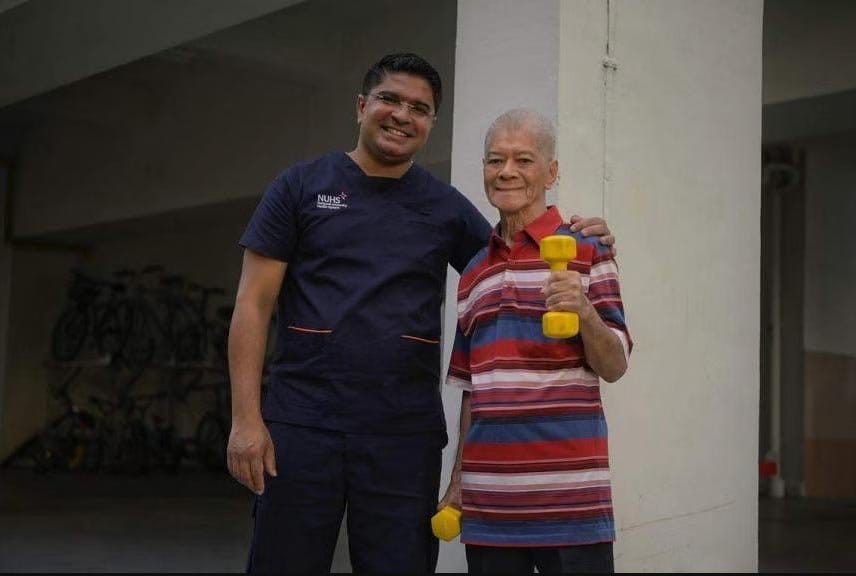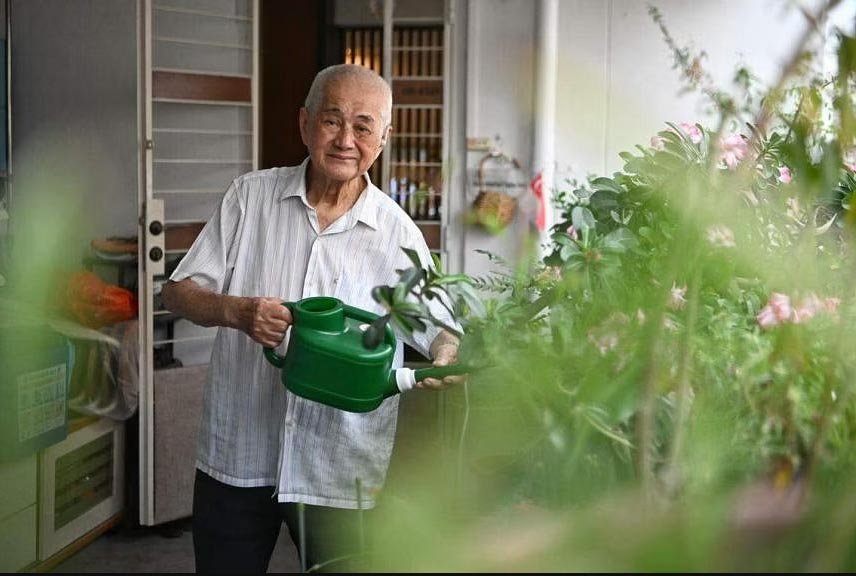May 22, 2023
SINGAPORE – Mrs Babe Lim fell as she was getting out of her son’s car in July 2022, and fractured her right shoulder and hip.
Her age of 94 made surgery risky, but Ng Teng Fong General Hospital (NTFGH) consultant Kevin Yik still recommended it, noting that the alternative for Mrs Lim would have been to stay in bed or move around in a wheelchair for at least six weeks.
But that would cause the great-grandmother a significant loss of strength, from which she might not be able to recover, said the orthopaedic surgeon.
Dr Yik proposed instead that Mrs Lim undergo the two operations separately, allowing three months for recovery in between.
“I told him, ‘no, doctor, do both at one time’,” Mrs Lim told The Straits Times.
She is among a growing number of seniors here going under the knife, as Singapore’s population continues to age.
“We have seen an increasing trend of older patients undergoing major surgery in recent years,” said Dr How Kwang Yeong, senior consultant with the general surgery department at Tan Tock Seng Hospital.
The proportion of patients aged 80 and above undergoing major elective large bowel surgery has increased from about 15 per cent five years ago to more than 20 per cent in 2022, Dr How said.
Breast cancer surgery in the age group has climbed from 4 per cent to more than 10 per cent, and knee replacement surgery has risen from 5 per cent to 9 per cent over the last three years, he added.
Meanwhile, Khoo Teck Puat Hospital saw a 30 per cent increase in elderly patients undergoing colorectal cancer surgery between 2019 and 2022, with around 70 per cent of these operations being elective.
Longer lifespans are part of the reason for this increase, said Dr How, noting that conditions such as osteoarthritis of the knee, hip fractures and cancers become more common as people age.
The average life expectancy for people in Singapore has increased from 72 in 1980 to 83 in 2021.
In April, Minister for Health Ong Ye Kung said that by 2026, Singapore would become a “super-aged” society, where at least 21 per cent of the population is aged 65 and older.
Dr Yik noted that while there are risks associated with surgery and anaesthesia – which has been linked to an increased risk of cognitive dysfunction among the elderly – medical literature over the years has shown the clear benefits of surgery in terms of improvements in function and mortality rate.
For example, while the mortality rate at one year after a hip fracture is upwards of 25 per cent for seniors, this is reduced to under 10 per cent with surgery, he said.
While more complex procedures used to require open surgery – which carries a slightly higher risk of infection and a longer recovery period – keyhole surgery is now employed for a wider range of conditions, benefiting the elderly, said Alexandra Hospital general surgery deputy head Sujith Wijerathne.
“The less invasive the surgery is, the better and faster the recovery is,” he said.

Dr Sujith Wijerathne (left) with retiree Francis Ee, who underwent laparoscopic inguinal hernia repair, a keyhole operation. ST PHOTO: MARK CHEONG
Keyhole surgery refers to minimally invasive procedures carried out through very small incisions in the body.
Not all cases are suitable for surgery, said NTFGH’s Dr Yik, such as those involving patients who are frail or “minimally ambulant”.
“Functionally, there wouldn’t be much benefit in going through with the surgery,” he said.
Hospitals are also doing more to prepare seniors for surgery.
For example, the geriatric surgical services at KTPH take into account factors such as nutrition as well as anaesthetic and surgical techniques in ensuring seniors are prepared for the operation, while rehabilitation after surgery assists with their recovery.
Mrs Lim has by now recovered well enough to resume her weekly 3km trek between her Bukit Batok flat and the market for her groceries.
“My friends, my family, they tell me, you’re improving very well,” she told ST.
Seniors seeking surgery
Francis Ee, 89
Retired sales representative Francis Ee had a hernia in his lower abdomen more than 20 years ago but managed – without going for an operation – to cope by regularly massaging it into place.
However, on the third day of Chinese New Year in 2023, Mr Ee was in such great pain that he felt he had no choice but to see a doctor.
He later underwent laparoscopic inguinal hernia repair – a keyhole procedure that took about 1½ hours – at Alexandra Hospital, and was discharged on the same day.
He is recovering well and is able to exercise regularly, lifting light weights and cycling on a stationary bicycle at the exercise corner near his Ghim Moh home.
“Everything is okay now, there’s no pain now,” he said.
Tan Hak Leng, 84

Mr Tan Hak Leng went through minimally invasive colorectal surgery in June 2022, and was discharged five days after the operation. ST PHOTO: ARIFFIN JAMAR
Mr Tan Hak Leng has had prostate issues for some years, but his family suspected something might be amiss when the 84-year-old was found to have a low haemoglobin count.
Doctors at Khoo Teck Puat Hospital recommended the retiree undergo a colonoscopy, which revealed a tumour later found to be cancerous.
His son, 55-year-old product marketing executive James Tan, told ST that a cardiologist had warned his father – who had previously undergone heart stent surgery – that he could go into cardiac arrest if they chose to remove the tumour.
However, KTPH colorectal surgeon Dr Daniel Lee recommended a keyhole procedure, which would present fewer complications.
After going through minimally invasive colorectal surgery in June 2022, Mr Tan was discharged after five days of observation and recovered at home.
He was assigned a caregiver, who stayed with him for two weeks, with a physiotherapist coming every couple of days to help him with his exercises.
Mr Tan has seen his blood sugar and cholesterol levels improve, and is now able to walk around without feeling short of breath.
“If we had chosen not to operate, it could have been worse,” said his son.


